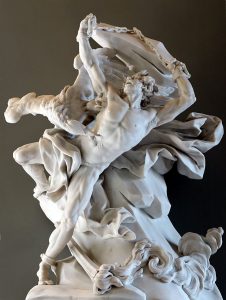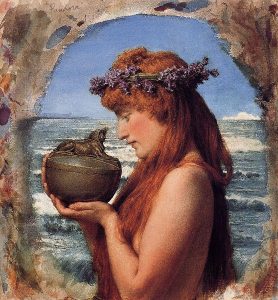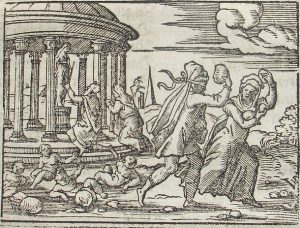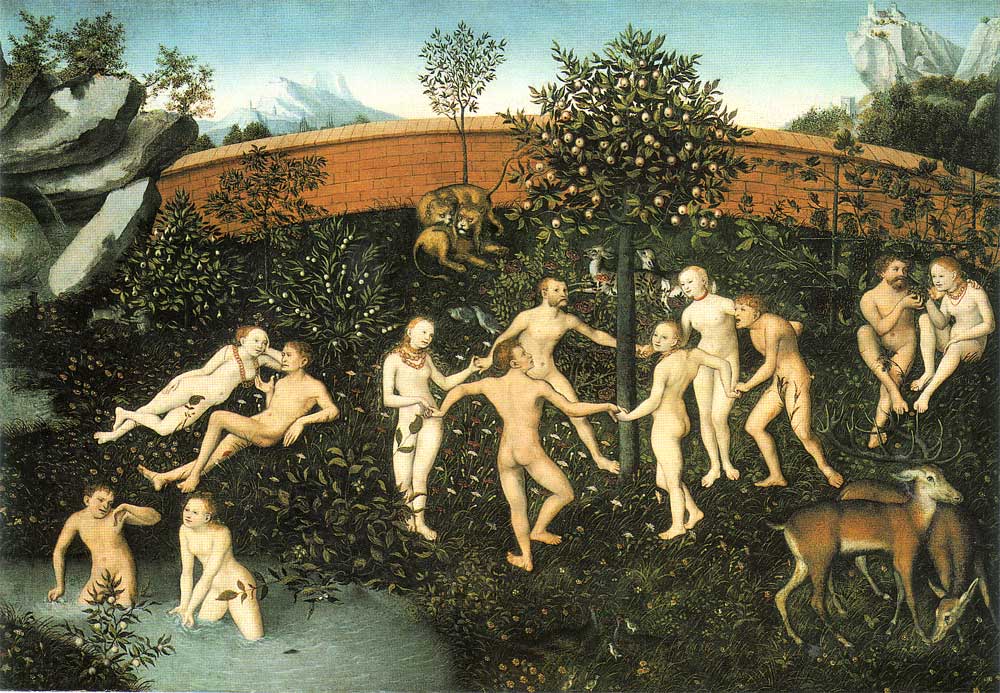The Creation of Humankind (Greek Mythology)
Hesiod’s Five Ages of Man
The classic Greek Five Ages of Man came from an 8th century BCE poem written by a shepherd named Hesiod, who along with Homer became one of the earliest of Greek epic poets. Hesiod to write the 800-line epic poem called Works and Days. In it, Hesiod tells a Greek creation story that traces the lineage of mankind through five successive “ages” or “races” including the Golden Age, the Silver Age, the Bronze Age, the Heroic Age, and the present Iron Age.
The Golden Age
Mountains, plains and seas were created, and the universe was filled with deities. But there was no humankind on the earth yet. Hesiod says that the first human generation, the Golden Generation, was seen on earth during the time of Cronus whom the Romans called Saturn. The Golden Age was a time of virtue and plenty under the leadership of the Titan Cronus. This delightful period, however, ended in a war when the children of Cronus joined together to battle against the Titans. Mortals lived like gods, never knowing sorrow or toil; when they died, it as if they were falling asleep. No one worked or grew unhappy. Spring never ended. When they died, they became daimones (a Greek word only later converted to “demons”) who roamed the earth. When Zeus overcame the Titans, the Golden Age ended.
Silver and Bronze Ages
Following the Golden Age race, which suddenly disappeared, a second generation was seen after Zeus gained dominance in Olympus. Less brilliant as the Golden Age, the Silver Age was a time during which human beings refused to obey the gods. Human beings belonging to this generation, who were known as the Silver Generation and whose childhood lasted for a hundred years, did not respect the gods or visit the temples. Zeus became angry with these people and caused the World to have four different seasons as opposed to one single season, which used to exist until that day. Therefore people had to take shelter in caves in the cold of winter. Yet the tactlessness of these people would not end so Zeus cast them into underworld and turned them into underground sprits. When they died, they became “blessed spirits of the underworld.” In Mesopotamia, silver was the metal of the moon. Silver is softer with a dimmer luster than gold.
Zeus then created a third generation. This generation was the Bronze Generation. Zeus created men from ash trees—a hard wood used in spears. Bronze Age were terrible and strong and warlike. Their armor and houses were made of bronze; and they did not eat bread, living mainly on meat.
The Age of Heroes and the Iron Age
Having also destroyed this generation, Zeus later created the Generation of Heroes. For the fourth age, Hesiod dropped the metallurgical metaphor and instead called it the Age of Heroes. The Age of Heroes was a historical period to Hesiod, referring to the Mycenaean age and the stories told by Hesiod’s fellow poet Homer. The Age of Heroes was a better and more just time when the men called Henitheoi were demigods, strong, brave, and heroic. Many were destroyed by the great wars of Greek legend. After death, some went to the Underworld; others to the Islands of the Blessed ones
The fifth age was the Iron Age and the Iron Generation. He made them experience fear, sadness and happiness. All manner of evils came into being during this age. Piety and other virtues disappeared and most of the gods who were left on Earth abandoned it.
Prometheus and Epimentheus

Titan Iapetus had offsprings with Oceanus’s daughter Clymene, which were named Atlas, Menoetios, Epimetheus and Prometheus. Prometheus was seen as helpful and stood beside Zeus. The other two siblings of Prometheus and their father sided with the Titans. Thus Zeus had slain Menoetios with his thunderbolts. After he defeated the Titans, he punished Atlas by making him carry the world on the western end of the universe. When Heracles went to western most part of the world to pick the golden apples, as part of the twelve tasks given by Hera, he found Atlas there carrying the World. Only Atlas knew where the golden apples were. So he buried Atlas’s load for a while and sent him forth to pick up the golden apples. When Atlas came back with the apples, he was not willing to carry the burden of the World anymore; however, Heracles tricked him into carrying the World again.
Atlas’s other siblings Prometheus and Epimentheus sided with Zeus too; therefore, Zeus kept them near. When Zeus defeated the Titans and the Gigantes, he settled in Mount Olympus and formed the group of Twelve Olympian god with his siblings and children. They shared the universe and began to rule from the location. Zeus took Prometheus near him because Prometheus not only did not object to him but also gave him ideas that helped him achieve victory. He was very cunning. He was able to deal with Zeus due to his intelligence and wit. But at times, he also drove Zeus crazy with his wiliness.
Zeus would join among the people sometimes and eat with them. On one occasion, it fell upon Prometheus to arrange the sharing of sacrificed ox. Prometheus, who had always been a friend of human beings, resented Zeus somewhere deep inside for destroying his race. Therefore, he set the decent parts of the one side ox on one side, and the bones on the other side. He placed portions of paunch on top of the meat, and covered the bones with fatty portions. When he asked Zeus which part he would prefer, the god of gods reached fort the nice-looking part. Zeus eventually realized that Prometheus was fooling him. He was outraged by his behaviour and forbid fire to the belovec people of Prometheus out of vengeance. Thereupon, Prometheus hid some fire within a fennel stalk and brought it from Olympus back to the people. Let us learn from Hesiod what happened next:
But afterwards Zeus who gathers the clouds said to him in anger: “Son of Iapetus, surpassing all in cunning, you are glad that you have outwitted me and stolen fire—a great plague to you yourself and to men that shall be. But I will give men as the price for fire [[in recompense]] an evil thing in which they may all be glad of heart while they embrace their own destruction.” So said the father of gods and laughed aloud.”
And he bade famous Hephaestus make haste and mix earth with water and to put in it the voice and strength of human kind, and fashion a sweet, lovely maiden-shape, like to the immortal goddesses in face.
The order of Zeus was obeyed by Haphaestus immediately. The new creation was a beautiful as goddess. Her face and her body were like those of a maiden’s; youthfull and proportionate. They put it in her a spirit and life. Athena gave to her a girdle. The divine Charites put necklaces of gold upon her. The Horae crowned her head with spring flowers. They called this excessively beautiful first woman Pandora, meaning the gift of gods.
Zeus commanded that this woman be sent to Epimetheus, who was not as smart as his brother Prometheus. Prometheus admonished his brother not to accept any gifts from the gods, knowing that was not as cunning as himself. He told him the gift to be sent would become a plague to the people. Epimetheus swore that he would not accept any gifts. However, when the door was knocked and he saw an irresistibly beautiful being outside, he forgot about all his promises and let her in. He married this beautiful woman the next day.
Pandora box
According to Hesiod, Pandora was a curse on mankind as retribution after the Titan Prometheus stole fire and gave it to humans. Gods had

also given Pandora box. When Pandora opened the box, fears, sorrows, illnesses and troubles sprang from it. They spread all over the World before she was able to close the box. When the box was finally closed, the only thing remaining inside was ‘hope’ which made all humanity chase after itself. Human beings, who lived without any trouble unto that day, began to face great afflictions. Zeus’s revenge against the people proved to be harsh. The fact that this revenge as taken by way of a woman made it even more painful. Pandora was to be the first of a race of women, the first bride and a great misery who would live with mortal men as companions only in times of plenty, and desert them when times became difficult. Her name means both “she who gives all gifts” and “she who was given all gifts”. Never let it be said that Greeks had any use for women in general.
Prometheus
The story of Prometheus remains one of the most popular of the Greek myths. The original creator of man, he sought to help us live plentifully even while he heroically suffered the consequences. Zeus now thought Prometheus needed to be punished. He ordered Hephaestus to take him to the highest peak of the Caucasus Mountains and shackle him there. He chained Prometheus to craggy rocks. Yet the accounts were not settled for Zeus and he set an eagle on him. The eagle ate his liver ever day. At night the liver would be regenerated and the eagle would start eating it again. This infliction went on and on under the burning sun.
While Prometheus served his punishment on the Caucasus Mountains, Zeus pursued new love affairs in Olympus. Around the same time, a prophecy was consuming Zeus internally. The prophecy was that a child to be born from a woman Zeus would marry was going to exceed him in power and overthrow him. Who ws this child going to be born from? This could only be known by Prometheus who had foreseeing abilities. eus gave Prometheus two ways out of this torment. He could tell Zeus who the mother of the child that would dethrone him was. Or meet two conditions: First, that an immortal must volunteer to die for Prometheus. Second, that a mortal must kill the eagle and unchain him. Eventually, Chiron the Centaur agreed to die for him and Heracles killed the eagle and unbound him. So, he forgave Prometheus and dispatched his son Heracles to bring him. Heracles slew the eagle which ate on Prometheus every day with its sharp beak. When Prometheus was elevated again to the echelon of the threat, turned out to be Thetis, the daughter of Nereus, whom Zeus set his heart on and wanted to marry. However, fearing that the prophecy would come true, he had to bury his love in his heart. As a result, he had Thetis marry a mortal named Peleus. Even though Thetis resisted ardently not marrying the aged Peleus, she was not able to disobey the decision of the gods.
The Story of the Flood

When Zeus decided to destroy the Iron Generation with a deluge, he told Deucalion, the son of foresighted Prometheus, to build a boat and to travel inthis boat together with his wife Pyrrha (daughter of Prometheus’ brother Epimetheus and Pandora). A vehement deluge began soon after, seizing and killing all the people. The boat on which Prometheus, his son, and wife were, tussled with the waters for nine consecutive days and nights and landed on top of Mount Parnassus. Having survived the disaster, Deucalion offered a sacrifice here to Zeus. All alone in the world, they wanted company. In answer to this need, the Titan, and goddess of prophecy Themis cryptically told them to throw the bones of their mother behind them. This greatly contended Zeus and he in turn asked of Deucalion’s wish via Hermes the messeger god. He wished the perished generation of humankind to be created again. Zeus said, “Throw behind you the bones of your mother”. They were utterly confused by this remark. So, they went into the Temple of themis and consulted with an oracle. The oracle also advised them to throw behind the bones of their mother, but Deucalion conceived that these were Stones on the Mother Earth. Deucalion threw behind stones and they became men, and the stones that Pyyrha threw became women. Deucalion and Pyrrha settled in Thessaly where they produced offspring the old-fashioned way. Their two sons were Hellen and Amphictyon. Hellen sired Aeolus (founder of the Aeolians), Dorus (founder of the Dorians), and Xuthus. Xuthus sired Achaeus (founder of the Achaeans) and Ion (founder of the Ionians).
Sources
Brown AS. 1997. Aphrodite and the Pandora Complex. The Classical Quarterly 47(1):26-47.
Ganz T. 1996. “Early Greek Myth.” Johns Hopkins University Press: Baltimore.
Griffiths JG. 1956. “Archaeology and Hesiod’s Five Ages.” Journal of the History of Ideas 17(1):109–119.
Harrison JE. 1900. Pandora’s Box. The Journal of Hellenic Studies 20:99-114.
Hurwit JM. 1995. Beautiful Evil: Pandora and the Athena Parthenos. American Journal of Archaeology 99(2):171-186.
Kirk GS. 1972. Greek Mythology: Some New Perspectives. The Journal of Hellenic Studies 92:74-85.
Wolkow BM. 2007. The Mind of a Bitch: Pandora’s Motive and Intent in the Erga. Hermes 135(3):247-262.

